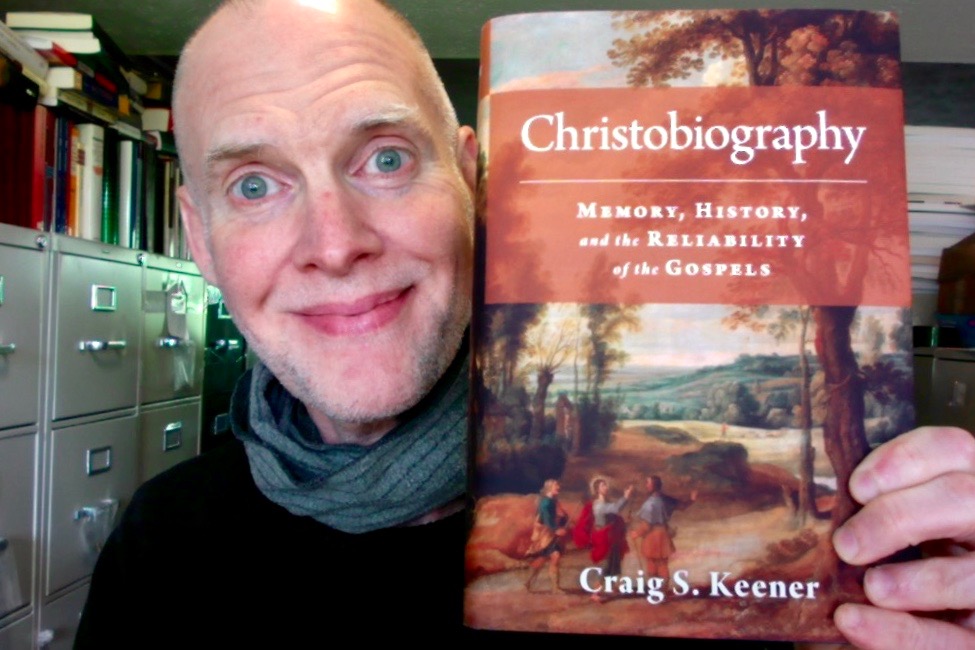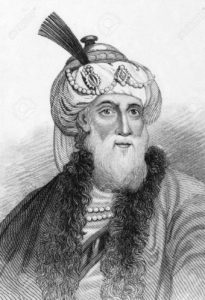Mike Licona interviews Craig about differences in the Gospels.
Category Archives: Gospels
Ancient biography and the Gospels (17.48 minutes)
Part 2 of Mike Licona’s interview with Craig regarding ancient biography (17.48 min’s). This one offers a good summary of Christobiography: Memory, History, and the Reliability of the Gospels: https://www.youtube.com/watch?v=OnztmnWOHTE

Kindle or hard copy on Amazon, ebook or hard copy on Christianbook.com
P.S., authors should do their best to communicate their intention, but inevitably authors get interpreted through the frameworks and categories of readers. My friend Bill Craig (William Lane Craig) interprets my friend Bart Ehrman’s interpretation of myself and some others here. 🙂
Mike Licona interviews Craig about scholarship and the guy who broke into his apartment
This is the first of a four-part series where Mike interviewed Craig at ETS 2019
Gospels and ancient biographies (1/2 hour)
Part 2 of the interview with Scott Rae of Biola regarding Christobiography: https://www.biola.edu/blogs/think-biblically/2020/ancient-biography-historical-jesus-part-2
Scott’s summary: How should we assess the accuracy of the gospel record of the life of Jesus, since the conventions of history writing were somewhat different in the ancient world compared to today. In his massive study, Christobiography, NT scholar Craig Keener compares the gospel record to the way ancient biography was written. Keener insists that the gospels should be regarded as historically accurate biographies, not historical novels, as some critics have maintained. Join us for part two of this conversation on this critical topic.
Ancient Biography and the Historical Jesus–32 minutes
Scott Rae interviews Craig Keener on the Think Biblically podcast. This is part 1 (32 min).
https://www.biola.edu/blogs/think-biblically/2020/ancient-biography-historical-jesus-part-1
Jesus in Ancient Historians
On a popular level, some writers dismiss all evidence for Jesus as inconsequential and view him as a pure creation of his followers. Even apart from the dismissal of many lines of evidence, this skeptical approach, if followed consistently, would make much of history unknowable.[1] As in the case of other new movements, whether from disciples of Socrates, Muhammad, Buddha, or Joseph Smith, the life of the founder was initially of little interest beyond the circle of his own followers. The Dead Sea Scrolls revere the founder of their community, the Teacher of Righteousness, yet he appears nowhere outside their own literature.
Likewise, the first-century Jewish historian Josephus claims to have been a Pharisee, yet he nowhere mentions the Pharisaic sage Hillel, whom most subsequent Pharisaic traditions name as one of their central figures.[2] Meanwhile, the Judean king Agrippa I, whom Josephus depicts as prominent even in Rome, merits only the barest passing mention in a Roman historian covering the period.[3] Another major Roman historian devotes little space even to Herod the Great.[4]
By the same criterion of relevance, the earlier Greek historian Herodotus neglected not only Judea but Rome.[5] And Josephus himself, despite his prominent role in the Judean war and as an interpreter of Judea for the gentile Greco-Roman world, merits no interest in later rabbis (who in fact show greater interest in Jesus).
This is not to imply that non-Christian reports about Jesus are altogether absent. Most scholars today recognize that the first-century Judean writer Josephus, who wrote about John the Baptist and Jesus’s brother James, also wrote about Jesus himself.[6] Josephus treats Jesus as a sage and wonder-worker executed by the governor, probably with the complicity of some of Jerusalem’s elite.[7] Many scholars argue that an early Arabic version also confirms the key points about Jesus that scholars have reconstructed as original (before scribal tampering) in Josephus’s account.[8] Possibly as early as 45 years after Jesus’s crucifixion, a Syrian philosopher named Mara bar Sarapion speaks of Jews executing their wise king, bringing judgment on Judea. (He probably heard this report from Syrian Christians.)[9]

By the early second century, one historian includes a report, from just two decades after the crucifixion, about Jewish debates in Rome, apparently concerning the Christ.[10] Another, reporting the slaughter of vast numbers of Jesus followers in Rome roughly 34 years after the crucifixion, mentions that Jesus himself was earlier crucified under Pontius Pilate.[11] Rome itself had finally taken notice, because subsequent events had made Jesus’s movement a matter of local significance. In fact, the movement had become more significant in Rome than was the governor who executed Jesus. Although Jewish sources and an inscription mention Pilate,[12] this passage marks his only appearance in surviving Roman literature.
Most importantly and most early, we have considerable information about Jesus in Paul’s letters to his congregations, beginning perhaps eighteen to twenty years after Jesus’s execution. Paul was certainly a Christian, but by his own admission he began his involvement with the sect as one of its persecutors rather than as one of its friends. While focusing on Jesus’s crucifixion and resurrection, Paul also mentions other information about Jesus, including the Twelve, Jesus’s brothers, Jesus’s being mocked and abused, his burial, his teaching about divorce, his words at the last supper, and so forth. Paul also attests what seems to be a widespread early Christian consensus about Jesus’s role as Christ and exalted Lord. Nevertheless, Paul’s situation-occasioned letters do not supply anything like a biography of Jesus or even narrate any episodes from his life before the passion.
If you want to keep reading, consider purchasing my book, Christobiography.
This content is by Craig Keener, but edited and posted by Defenders Media, 501(c)(3).
[1] Against this approach, see e.g., Ehrman, Did Jesus Exist?. Detractors cannot complain FFF: (as those who wish to avoid ad hominem arguments should not, in any case) that Ehrman, an agnostic, is motivated in this argument by religious bias. FFF: See also Casey, Evidence (from a non-Christian perspective; although sometimes polarizing and attributing more than appropriate to individuals’ psychological backgrounds, he is probably right to observe that British academia tend to show a greater commitment to fairness than do some polarized U.S. contexts); Elliott, “Pseudo-Scholarship” (focusing on T. Freke and P. Gandy, and on 10 noting “factual errors, misstatements, and methodological misunderstandings on nearly every page”).
[2] See the comments by Israeli historian Flusser, Sage, 1; Flusser, “Ancestry,” 154; Flusser, “Love,” 154, compares the case of the Jesus movement with the followers of Simon Kimbangu or Joseph Smith. The analogies are of course inexact: for example, unlike Smith, Jesus left no written record; and unlike Jesus, Kimbangu did not train disciples (in the ancient Mediterranean sense). But the examples are sufficient for Flusser’s point.for Socrates, see Kennedy, “Source Criticism,” 130; for the principle that it is those who care about a figure who preserve his or her memories, see Schwartz, “Smoke,” 11.
[3] Tacitus Ann. 12.23.
[4] Dio Cassius 49.22.6; 54.9.3.
[5] Josephus Apion 1.60-66, esp. 66.
[6] On Josephus’s genuine mention of Jesus, see Meier, “Jesus in Josephus”; idem, “Testimonium”; Whealey, “Josephus”; idem, “Testimonium”; Gramaglia, “Testimonium”; Paget, “Observations”; Vermes, Jesus the Jew, 79; Charlesworth, Jesus within Judaism, 90-98; idem, “Jesus, Literature, and Archaeology,” 189-92; Dubarle, “Témoignage”; Ehrman, Prophet, 59-62; Theissen and Merz, Guide, 64-74; Van Voorst, Jesus, 81-104; Niemand, “Testimonium.”
[7] Josephus Ant. 18.63-64.
[8] See Agapius in Charlesworth, Jesus within Judaism, 95-96; Hilarion, Beginning, 11-refs (noting Pines, Version, 16); but see Whealey, “Testimonium,” esp. 587-88.
[9] Theissen and Merz, Guide, 76-80.
[10] Suetonius Claud. 25.4; see Keener, Acts, 3:2697-2711, esp. 2708-11; Keener, “Edict.”
[11] Tacitus Ann. 15.44. FFF: Second-century authors also lampoon or criticize the Christian movement and its founder; see e.g., Lucian Peregrinus 11; cf. Celsus in Origen Cels.
[12] See e.g., Philo Embassy 299, 304; Josephus Ant. 18.35, 55-64, 87-89, 177; War 2.169-75.
Academic review supporting article on plausibility of spirits
Today’s post will be of interest mainly to academics who allow for the possibility of spirits. I try to address it from a somewhat neutral academic standpoint, though neither those who know my biblical convictions nor my African experience will be surprised at my conclusions.
What is Christobiography about?
Christobiography draws attention to an old and yet sometimes neglected insight for historical-Jesus research: in terms of recognizable ancient genres, the Gospels are like ancient biographies. That is, the type of literary work from the Gospels’ era that they most closely resemble is the bios, or “life,” of a subject–what we call (and this book regularly titles) ancient biography.
Although a majority of Gospels scholars today recognize that the Gospels are more like ancient biographies than like anything else, only a minority of Gospels scholars have actually examined other ancient biographies in order to understand what implications this shared basic genre might have for the Gospels.
In the book (available here, or in ebook format, here), I examine the implications especially for the historiographic character of the Gospels. It won the biblical studies book awards in Christianity Today and the Jesus Creed blog, as well as book of the year in the Biblical Foundations Book Awards and the Foundation for Pentecostal Scholarship Book Awards. Hopefully somebody else likes it, too 🙂

This content is by Craig Keener, but edited and posted by Defenders Media, 501(c)(3).
Discipleship
People think of various things when they hear about discipleship. In the first century, though, being a disciple meant following a teacher or belonging to a group that followed a sage’s teaching. Most disciples of teachers started in their teens and passed on their teacher’s teachings. (Youth ministers take note: most of Jesus’s disciples were probably teenagers!)
Following Jesus was different in some respects from following most other kinds of teachers, but especially because Jesus was different from most other teachers. (This is clear for those of us who recognize Jesus’s deity.) His disciples grew to learn his compassion, his wisdom, his healing power. Disciples were supposed to imitate their teachers, and Jesus expected his disciples to carry on such work. Although we don’t have the advantage of Jesus’s presence with us physically right now, we have his most important teachings in the Gospels and we also experience his presence by the Holy Spirit. So we can continue to learn from Jesus. In terms of being disciples, we even have advantages that the first disciples initially lacked: for example, we already know, through their later testimony, that the cross was not a failure, that Jesus has risen, and that he is divine. It took them time to understand these matters.
Nevertheless, from the start, following Jesus was never meant to be incidental to one’s life. Most Jewish teachers expected their disciples to remember and pass on their teachings, but Jesus demanded more. Jesus called people to value him more than their livelihoods; sometimes fishermen and tax collectors left their businesses to follow Jesus. Jesus called people to value him more than financial security: he summoned a rich young ruler to donate everything he had to the poor, and Jesus taught disciples more generally to lay up their treasure in heaven.
Likewise, Jesus is above residential security. When someone volunteers to follow him across the lake of Galilee (Matt 8:18-19), Jesus warns that his mission offers less of a place to rest than foxes and birds have (Matt 8:20//Luke 9:58). Jesus matters more than society’s or even family’s approval. Someone else volunteers to follow Jesus once he has finished his final filial obligation, namely, burying his father. Given ancient funerary customs, the man is probably asking for either a year’s delay (to complete the secondary burial, if his father has died) or to wait until his father died. Jesus insists that matters of the kingdom are more urgent than that (Luke 9:59-60). And when someone else asks to just say goodbye to his parents—what Elisha requested before becoming a disciple of the prophet Elijah—Jesus declares the kingdom more urgent than even that (Luke 9:61-62)!
The Gospels show us that Jesus often used hyperbole—rhetorical overstatement—as a graphic way of making his point. Yet he makes the point so often that we should not underestimate what he wants. In Luke 14:33 he declares that if we are really his disciples, then everything we have belongs to him. A few verses earlier he insists that we must love him more than our families (14:26). Indeed, he warns, no one can be his disciple unless we take up the cross and follow him (14:27)—loving him more than life itself.
If you have fallen short of this so far, don’t despair. The Lord takes us where we are at and begins to transform us, if we invite him and welcome him to do so.
You see, Jesus’s first disciples did not take up their crosses to follow him. Jesus warns that no one can be his disciple unless we take up the cross and follow him. Yet when Jesus was arrested, his disciples abandoned him and ran off! Jesus’s executioners had to draft a bystander—Simon of Cyrene—to carry his cross because none of Jesus’s own disciples were there to do it. Indeed, they fell asleep on him at Gethsemane; his leading disciple denied him, and another disciple betrayed him. Jesus still went to the cross for all who would be his followers. He offered his life for us not because we were perfect, but because he knew what he could make us to be. As we continue to walk with him, he teaches us his heart. And the better we get to know him, the more we want to be like him.
Jesus is worth everything. He is like a pearl of great price or a treasure hidden in a field. We can learn to live like we really believe that. Living like we believe that means pouring the resources of our time, energy and money into things that count forever—investing in other people’s lives. Being a disciple of Jesus may cost us this world—but it promises us both the world to come and its foretaste in relationships of love in the present.
Good news about Christobiography
Usually I just post Bible studies, videos, etc. (and often silly cartoons) here, but I did want to pause to acknowledge gratitude. Christianity Today listed my recent book Christobiography as its top biblical studies book for this year. There were many other great books out this year but I’m grateful for the further attention this brings to this book.
https://www.christianitytoday.com/ct/2020/january-february/christianity-today-2020-book-awards.html
